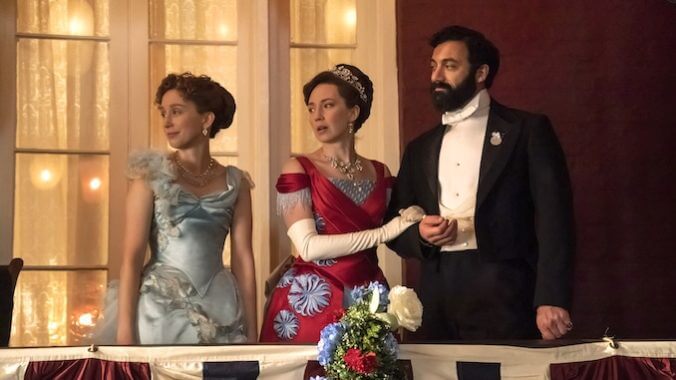The Gilded Age Is a More Focused, Still Delightfully Well Dressed Diversion In Season 2
Photo Courtesy of HBO
HBO’s The Gilded Age is not a serious television program. Don’t get me wrong—that’s not in any way an insult. In fact, it’s precisely what makes the show so great. Sure, it’s got all the trappings of a serious prestige period series (a massive cast of A-list actors, a hefty budget, a recognizable writer in Julian Fellowes, the man behind the juggernaut that was Downton Abbey) but, at its heart, it’s pure soap opera. And it’s so much more enjoyable when it embraces simply being entertaining rather than trying to make some sort of larger social statement or tell a particularly weighty story. Thankfully, its second season finally seems to realize that fact, gleefully jettisoning its dullest, preachiest elements in favor of even more breathtaking gowns, jaw-dropping architecture, and petty society squabbles. The end result is something that is both deliciously satisfying and strangely ephemeral, a celebration of glorious excess that we, as viewers, are simply asked to enjoy.
In its eight-episode second season, The Gilded Age is more fun, more focused, and more confident than ever, leaning fully—and unapologetically—into its most dramatic tendencies and framing its season around the sort of rich people problems that are both indulgent and completely ridiculous. (But that are somehow almost impossible to look away from.) There’s virtually no other show on television that could unironically center an entire season around the fate of two dueling opera houses and the question of which rich society lady is allowed to rent a box in which building to watch performances of a style of music they don’t even particularly like all that much. Yet, here we are, and it’s all sorts of delightful, particularly because these battles primarily involve fancy dinner parties and sly verbal barbs.
Not content with her social ascension at the conclusion of Season 1, Bertha Russell (Carrie Coon) longs for a box at the prestigious Academy of Music. The possession of such a box is another big status symbol among New York’s moneyed elite, and it’s yet another arena dominated by the famous Mrs. Astor (Donna Murphy). But despite her successful ball, Mrs. Russell is denied entry into the ranks of the Academy’s most favored patrons—she can’t be expected to buy an orchestra ticket like some commoner—and she’s very unhappy about it. So unhappy that she’s ready to back the upstart new Metropolitan Opera and proverbially spit in Mrs. Astor’s face while doing so, even going so far as to set its opening performance for the same day as the Academy’s.
Bertha immediately sets out trying to tempt the rich and powerful of New York City to choose her organization over Mrs. Astor’s, all while insisting that’s not at all what she’s doing. Her devoted Wife Guy husband George (Morgan Spector) is there to help support her with both funds and advice, and Ward McAllister (Nathan Lane) is playing both sides between the two women. This opera war is (naturally) almost exclusively conducted via a variety of increasingly elaborate dinners, parties, and social events, as both Mrs. Russell and Mrs. Astor scheme and cajole everyone around them. It’s as delightfully petty and pretty as one could ever expect and the story raises questions no more serious than which lady will wear the most elaborate hat. (And let me tell you, both women pull out some stunners.)
Elsewhere, Agnes van Rhijn (Christine Baranski) remains as much of an old-money traditionalist as ever, though she seems content to disapprove of Bertha from a distance this season. (Unsurprisingly, she’s on Mrs. Astor’s side in the whole opera house business.) She’s more interested in finding her niece Marian (Louisa Jacobson) a proper suitor and judging her son Oscar (Blake Ritson), who’s still on the hunt for a rich wife, despite the fact that he’s very clearly in love with a man. Thankfully, both Marian and Oscar have become something much closer to three-dimensional characters this season, and the friendship between them makes the van Rhijn household feel more like a cohesive family unit and less like a space where everyone lines up to get bullied by the woman in charge of it.
-

-

-

-

-

-

-

-

-

-

-

-

-

-

-

-

-

-

-

-

-

-

-

-

-

-

-

-

-

-

-

-

-

-

-

-

-

-

-

-








































